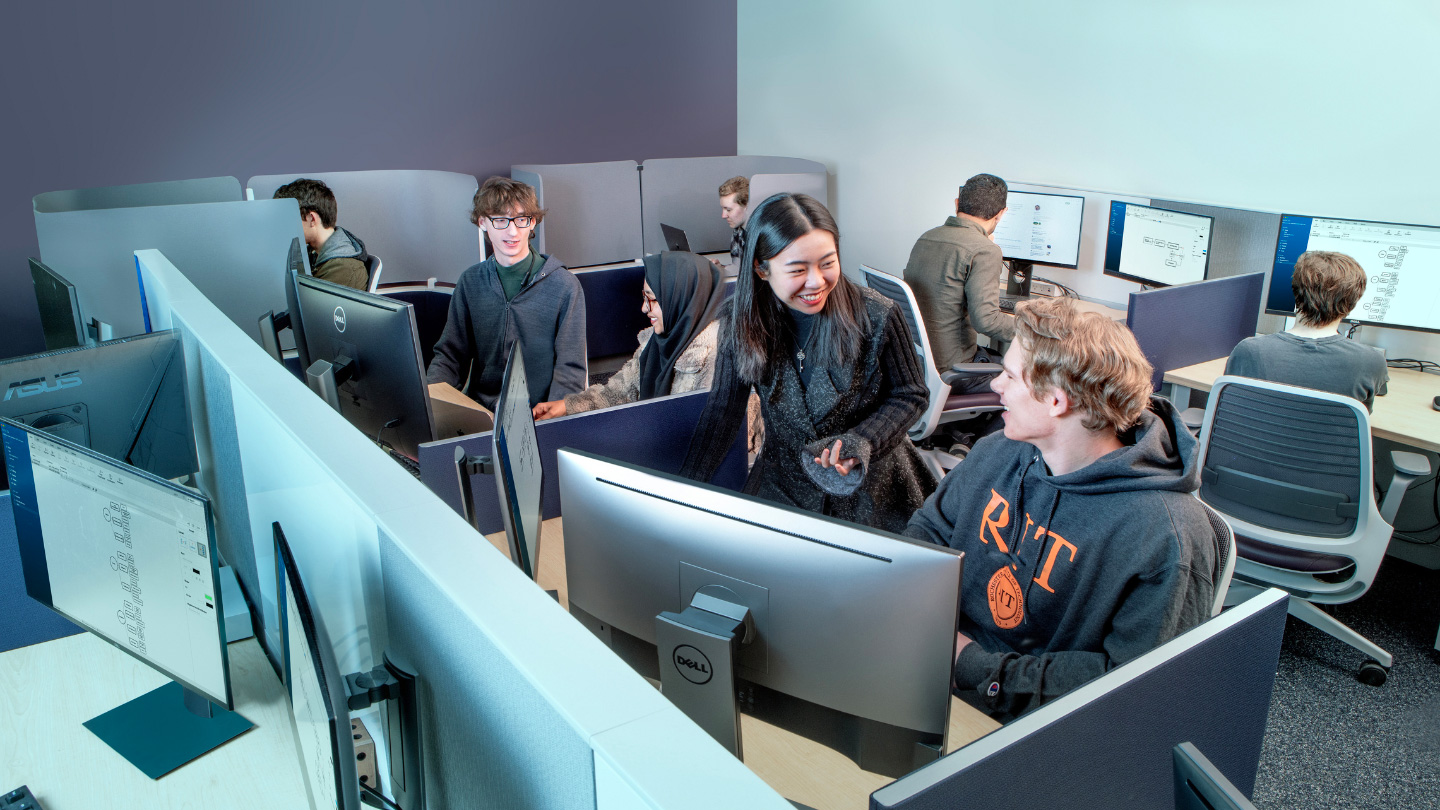School of Interactive Games and Media


School of
Interactive Games
and Media
Breadcrumb
- RIT/
- Golisano College of Computing and Information Sciences/
- Academics/
- Departments and Schools/
- School of Interactive Games and Media
Contact
State-of-the-art facilities and technology
Community of engaged students and faculty
Renowned co-op program
High job placement rate in computing fields
Top 10
One of the best game design and development programs in the nation, according to Princeton Review
96%
Job placement rate since 1998
$10k
Won by our national championship-winning Dota 2 Esports team
Overview
The School of Interactive Games and Media (IGM) comprises faculty from a variety of academic backgrounds with a shared interest in computing as it relates to interactive media, games, simulations, VR/AR, experimental interfaces, and media-centric systems of all varieties. IGM provides an educational environment that supports and encourages creative and collaborative academic inquiry by both faculty and students. IGM’s programs, coursework, research, and development efforts provide students with the knowledge and skills to pursue meaningful and rewarding careers in media-centric, interactive software development, while simultaneously advancing the field and helping to provide a well-rounded educational experience.
IGM Faculty Openings
Interested in joining our IGM faculty team at RIT?
We are currently accepting applications for a Tenure-Track position, available at both Assistant Professor and Associate Professor ranks. The salary between these ranks ranges from $100,000-$125,000.
We are also accepting applications for a Non-Tenure Track position. The salary range is between $78,000-$83,000.
The university offers a competitive start-up package with excellent benefits including tuition benefits. Learn more about our benefits.
Curricula and course descriptions:
- New Media Interactive Development BS (partners with New Media Design BFA)
- Game Design and Development BS (scroll down to see BS/MS option)
- Game Design and Development MS
- Both game degrees partner with Game Arts in the College of Art and Design.
What our students do:
- MAGIC Center at RIT
- IGM Featured Work (below)
- IGM Student Gallery; See also:
Undergraduate Programs
The game design and development major empowers students to explore the entertainment technology landscape and related areas, while still pursuing a broad-based university education. The degree is intended specifically for students who aspire to hold careers within the professional games industry or a related field, such as simulation, edutainment, or visualization.
RIT is ranked 3rd among top universities in the world for students who want to study and create games, according to the 2023 international rankings from The Princeton Review.
Learn more about the Game Design and Development BS programRIT’s new media interactive development degree adapts digital technologies for social software, wearable devices, touch interfaces, virtual/augmented reality, and more.
Learn more about the New Media Interactive Development BS programGraduate Programs
The Master of Science degree in game design and development covers the breadth of the game development field through course work in topics such as computer graphics, game engines, interactive narrative, and game design. The degree is specifically for students who aspire to careers within the professional gaming industry or a related field such as simulation, edutainment, or visualization.
The Ph.D. in computing and information sciences is a research degree that produces independent scholars, cutting-edge researchers, and well-prepared educators. You'll study with RIT's world-class computing faculty and take advantage of diverse academic offerings and modern facilities as you identify and research challenges within and beyond computing.
Learn more about the Computing and Information Sciences Ph.D. programRIT is ranked 4th among top universities in the world for students who want to study and create games, according to new international rankings from The Princeton Review.
Learn more about the Game Design and Development MS programMinors and Immersions
Free and open source software is released with licenses that allow it to be redistributed freely for others to use, copy, and/or modify within certain restrictions and conditions. Free culture refers to writing, art, music, and other creative materials released with rights for reuse and/or redistribution that are more flexible than those of the traditional marketplace. Both are often created and/or distributed by collaborative teams with members around the world. The minor in free and open source software and free culture is intended for students who want to develop a deep understanding of the processes, practices, technologies, financial, legal, and societal impacts of these movements. The minor includes a set of computing and liberal arts courses that explore these aspects through research, analysis, and participation in these communities via the creation of digital cultural artifacts and team-driven software projects. Students complete three required courses, one constrained elective course, and one elective course.
Learn more about the Free and Open Source Software and Free Culture Minor programBusiness, the arts, the sciences, and the humanities now rely on work that is “open," work that is released in a manner that allows it to be shared, copied, and improved upon by its users. Open Source Software powers the internet and the World Wide Web, Open Data, and Open GIS mapping. All of these are at the core of most digital humanities projects. Creative Commons licenses allow artists, musicians, and writers to collaborate more freely by altering the “all on or all off” conditions of copyright. The Open Hardware of the Raspberry Pi and Arduino board drive the maker movement and interactive arts.
Learn more about the Free Culture and Free and Open Source Computing Immersion programThe game design and development minor is intended for students studying in a technical field who want to combine their knowledge and skill in software development with the media-centric approach to application design that is exemplified in the professional games and simulation industries. The minor defines a series of courses that build upon students’ existing knowledge in computing, physics, and mathematics to explore the design principles of games and interactive worlds through the creation of prototypes and software projects.
Learn more about the Game Design and Development Minor programThe game design minor is intended for students outside of technical computing majors who want to explore the process and principles of game design and the associated theories of interactive media. The minor provides an introductory experience to media-centric software development that enables students to prototype and test their own designs.
Learn more about the Game Design Minor programAs the world grows in complexity and interconnectedness, new challenges arise in visually representing, reasoning, and making sense of spatially-oriented problems and data. The geographic information systems immersion allows students to study geographic problem solving and scientific inquiry from an interdisciplinary perspective of interactive, digital mapping tools and related digital data problem solving technologies. Students are introduced to geographic mapping concepts and theory, digital cartography, geographic problem solving with geospatial and related computer tools, geospatial technology ethics and application of GIS to global problems such as natural disasters.
Learn more about the Geographic Information Systems Immersion programThe geographic information systems (GIS) minor provides students with experience in the concepts, technology, and applications related to computer-based mapping, spatial databases, and geographic analysis and problem solving. The minor features two tracks: a GIS development track for students interested in GIS software development, and a GIS analysis track for students interested in utilizing GIS as a strong methodological base within their major of study. Required courses provide core GIS foundations applicable to a variety of multidisciplinary elective courses students can choose from to match their research, post-graduate, or career interests.
Learn more about the Geographic Information Systems Minor programLatest News
-
March 27, 2024
![The RIT Esports Halo team practices for competition sitting at a desk with computers wearing orange and white team shirts.]()
RIT Esports unites students with a competitive spirit and a passion for gaming
RIT’s Esports Counter-Strike 2 team won the Varsity Premier division of the National Association of Collegiate Esports last semester, and its Hearthstone team has had players enter the top eight, two semesters in a row.
-
March 21, 2024
![A student binds a book in the textile makerspace in the SHED.]()
Innovation unleashed: students forge transdisciplinary projects at RIT's a2ru summit
Students leveraged the variety of makerspaces in RIT's brand-new SHED facility to create arts-integrative work responding to a theme of "Play."
-
March 21, 2024
![a view from above a computer workstation shows two students working on computers and keyboard]()
RIT game design and development programs ranked among top 10
RIT is one of the top 10 universities for students looking to land their dream job as a game designer, according to new international rankings from The Princeton Review.
Research Areas
IGM Faculty within the School are actively engaged in many research areas. Both undergraduate and graduate students have opportunities to work with our faculty in their research areas.
Learn more about
- IGM Research
- Key Research Areas in Golisano College of Computing and Information Sciences
- Research at RIT
Featured Work
Computing Ph.D. Student Leads Groundbreaking Research with KAIST Interaction Lab
Jiangnan Xu
Jiangnan Xu travels to Korea with the School of Interactive Games and Media to study the intersection of AI and the Metaverse.
Overcaste
Nuha Syed, Destiny Treptau, Sean Foley, Will o’Brien, Corinne Fair, Mason Hayes, Ajay Ramnarine, Gel Howell ’23
Overcaste is a 3D adventure game with brisk and graceful movement, and a beautiful desert to explore.
Within These Walls
Corinne Fair, Gel Howell, and Katarina Tretter
Within These Walls is a first-person psychological horror game that invites the player to question the reality that they know.
Student Resources
Here you will find additional resources for the School of Interactive Games and Media, such as advising, student gallery, lab resources, etc.
Future Undergraduate Students
Future Graduate Students
Undergraduate Academic Advising
Graduate and Undergraduate Bulletins at RIT
First Year Student Details
Student Experience
Student Gallery
Labs and Technology Resources
Media Labs
Student Competitions
The faculty and staff in IGM are looking forward to working with you during your college career.
EDGE - Experiential Development & Games Expo
Step into the future of interactive media at EDGE 2024, the Experiential Development & Games Expo, proudly presented by the School of Interactive Games and Media (IGM). Formerly known as the RIT Student Game Showcase, EDGE is a full-day celebration that brings together students, faculty, alumni, and industry professionals to honor the outstanding achievements of RIT's student-led creative development teams.
Join us in-person or virtually on Saturday April 13th, 2024 to experience firsthand the innovation of our remarkable student developers. EDGE is open to all audiences and we hope you attend!
Industrial Advisory Board
The IGM Industrial Advisory Board (IAB) consists of a broad range of industry representatives. The board helps us stay current with industry trends, offering insight on everything from curriculum to teaching methods. IAB plays an integral role in helping us maintain a balanced, vibrant school.
















